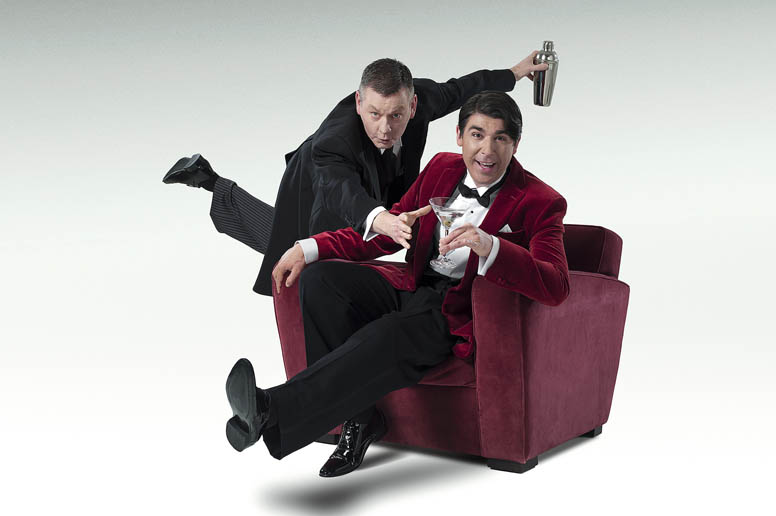Cambridge theatre-goers are in for a week of jocular japes this month as the Olivier Award-winning Perfect Nonsense transfers to Cambridge Arts Theatre from the West End.
Starring John Gordon Sinclair (Gregory’s Girl) and James Lance (Teachers), the show invites us into the wonderful Wodehousian world of cheery gentleman of leisure Bertie Wooster and his impeccable valet, Jeeves.
Called on to play matchmaker during a country house weekend, Bertie manages to land himself in a series of scrapes which only his cunning companion can resolve. Expect larks, liberal smatterings of “What ho!”s and, of course, loaded dollops of “Very good, sir”.
John Gordon Sinclair, stepping into the shiny shoes and bowler hat as Jeeves, says it’s the humour of P. G Wodehouse’s writing and the scriptwriters’ deft interpretation which have ensured the play’s immense success.
“Bobby Goodale, our writer, and director Sean Foley have done a great job. If you’re a Wodehouse fan you won’t be disappointed. All the characters and classic Wodehouse lines that litter the books are there, then they’ve added an extra element which makes it sort of like Wodehouse-meets-Monty Python.
“Lots of friends of mine who’ve come out the closet as Wodehouse fans have said they remember reading the books on busses, or by a pool, and just bursting out laughing. The humour is timeless: it’s just as funny today, if not funnier.”
P. G Wodehouse wrote over 70 novels and 200 short stories, with Bertie and Jeeves first appearing in 1915. Perfect Nonsense is a tribute to the series, drawing elements from the different Jeeves and Wooster stories.
“The characters are very human,” adds James Lance, playing perennial bumbler Bertie. “Wodehouse has written a perfect double act. I think that old adage that opposites attract is very true in this case. You couldn’t get much further apart than Bertie and Jeeves, but there’s a strange kind of synergy that occurs when they’re together. And while Bertie certainly couldn’t live without Jeeves, I also think Jeeves in some ways needs Bertie.”
Many will remember the iconic duo as played, magnificently, by Stephen Fry and Hugh Laurie (right), who met at Footlights while at Cambridge University. Both James and John are staunch fans of the series, but were able to come at the roles in their own ways.
“It’s first-class TV,” James enthuses. “In a way, because of those wonderful performances everyone, including myself, already has an idea of how Bertie should be. So I was a bit daunted by that initially. But then I started to read the novels and really investigate Bertie as a character. And inevitably my performance of him can only be my own, in the same way as Hugh Laurie’s can only be his.”
“There are certain things you can’t escape with Jeeves,” says John, “like the way he speaks. But because we’re playing lots of different characters it gives a lot more scope for playing around.”
The show sees John and James joined by Robert Goodale in portraying an entire cast of characters, from the imposing Aunt Dahlia to Bertie’s old school chums Gussie Fink-Nottle and ‘Stiffy’ Bing. Described in the books as a young gentleman with a ‘distinctive blend of airy nonchalance and refined gormlessness’, or simply a ‘fathead’, Bertie nonetheless carries endearing qualities in abundance, not least his affection for his pals.
“The interesting thing about Bertie is that he’s an orphan,” says James. “So he’s not grown up as part of a loving family, instead he’s been buffeted between nannies and aunts, Eton and Cambridge, and so latched on to friends: his job is helping his friends out. And of course Jeeves fills that paternal, almost maternal, role.
“I’ve fallen in love with Bertie,” James admits, “he’s such a fun character. He’s a big kid – an innocent. In that sense I’ve been able to revisit that childlike nature in myself. It’s really fun to be uncomplicated and as much in the moment as Bertie is.”
Jeeves, meanwhile, remains as mysterious as Bertie is transparent.
“He’s a kind of omnipresent, godlike figure,” John considers. “He’s this fount of knowledge, he knows all these different languages and he can do and solve anything. Still there’s so much you don’t know about Jeeves.” He jokes: “I think of him as sitting in this tiny little one-bedroom flat in Covent Garden, quite slovenly,” laughs John. “With a wee vodka and a fag. But no, he’s too pure for that.”
Jeeves and Wooster continue that rather British tradition of servants outwitting their masters, which dates back as far as Shakespeare’s ‘fools’. John agrees: “It’s a play on the class system. You have these toffs who think they’re vastly superior and run the world, but in actual fact they don’t. I think that appeals.”

